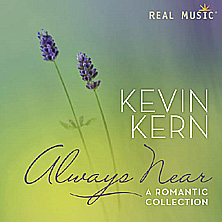 When music listeners think of Real Music, they think of the high quality
instrumental New Age music that label has become synonymous with.
Always Near—a new for 2014 compilation by Kevin
Kern should go a long way towards keeping the Real Music name
front and center among instrumental music fans. The 64 minute CD collection
draws upon ten different albums recorded by Kern and released on Real
Music. Although Kern’s grand piano sound is mixed front and center,
throughout the CD he does receive sonic support from several musicians.
Kern was greatly influenced by jazz piano legend George Shearing and
he also cites Bach and Mozart, although the New Age feeling here is
anything but purely classical in scope. Although he’s legally
blind, Kern channels his musical gift into a sonic vision that goes
beyond words. Speaking about Always Near, and explaining the
concept of the album, Kevin Kern tells mwe3.com, 'Always Near definitely
represents some of my best work from my Real Music years. However,
I really can't take credit for this CD. The fact is that Real Music
President, Terence Yallop, has a rare gift for assembling music from
diverse sources and turning it into a cohesive whole for the listener
to enjoy. This collection represents yet another example of this unique
ability on his part. Throughout my years with Real, I came to appreciate
the positive healing power that my music has had on listeners around
the world. I have been fortunate to make music that has been with
my listeners at the most remarkable times in their lives. It's been
a remarkable experience and I want to express my gratitude to everyone
for the chance to make a difference. ' Kevin Kern's inspiring
approach to performing New Age instrumental music on grand piano has
taken him far and wide and Always Near is the
perfect introduction to an artist who has defined superbly recorded
piano music in the 21st century.
When music listeners think of Real Music, they think of the high quality
instrumental New Age music that label has become synonymous with.
Always Near—a new for 2014 compilation by Kevin
Kern should go a long way towards keeping the Real Music name
front and center among instrumental music fans. The 64 minute CD collection
draws upon ten different albums recorded by Kern and released on Real
Music. Although Kern’s grand piano sound is mixed front and center,
throughout the CD he does receive sonic support from several musicians.
Kern was greatly influenced by jazz piano legend George Shearing and
he also cites Bach and Mozart, although the New Age feeling here is
anything but purely classical in scope. Although he’s legally
blind, Kern channels his musical gift into a sonic vision that goes
beyond words. Speaking about Always Near, and explaining the
concept of the album, Kevin Kern tells mwe3.com, 'Always Near definitely
represents some of my best work from my Real Music years. However,
I really can't take credit for this CD. The fact is that Real Music
President, Terence Yallop, has a rare gift for assembling music from
diverse sources and turning it into a cohesive whole for the listener
to enjoy. This collection represents yet another example of this unique
ability on his part. Throughout my years with Real, I came to appreciate
the positive healing power that my music has had on listeners around
the world. I have been fortunate to make music that has been with
my listeners at the most remarkable times in their lives. It's been
a remarkable experience and I want to express my gratitude to everyone
for the chance to make a difference. ' Kevin Kern's inspiring
approach to performing New Age instrumental music on grand piano has
taken him far and wide and Always Near is the
perfect introduction to an artist who has defined superbly recorded
piano music in the 21st century.
mwe3.com presents an interview with
KEVIN KERN
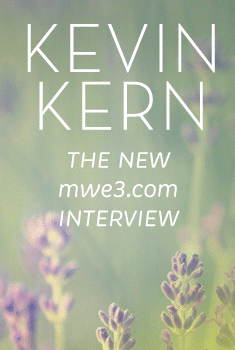 mwe3:
The newly released Always Near is a fantastic CD compilation
of your albums on Real Music. How involved were you in the planning
of the CD and in what ways do you feel Always Near represents
your best music? Are all your albums represented? Tell us a little
about the title track and another track that really stands out, track
5 “Above The Clouds”.
mwe3:
The newly released Always Near is a fantastic CD compilation
of your albums on Real Music. How involved were you in the planning
of the CD and in what ways do you feel Always Near represents
your best music? Are all your albums represented? Tell us a little
about the title track and another track that really stands out, track
5 “Above The Clouds”.
Kevin Kern: First, I'm very pleased that you enjoyed this collection.
It definitely represents some of my best work from my Real Music years.
However, I really can't take credit for this CD. The fact is that
Real Music President, Terence Yallop, has a rare gift for assembling
music from diverse sources and turning it into a cohesive whole for
the listener to enjoy. This collection represents yet another example
of this unique ability on his part.
With respect to Always Near, I have featured guitar
liberally throughout my Real Music offerings. From the very beginning,
I've found that the guitar is an ideal instrument with which to carry
on a musical conversation. Always Near is a great example
of this at its best.
“Above the Clouds” is one of those songs that derives its
ethereal character from the orchestration, a combination of strings
and voices created by Johnny Marshall, a remarkably perceptive musician
based in Dallas. It was he who breathed something special into that
song that really complemented my piano playing on my CD, Embracing
the Wind.
mwe3: Your bio mentions influences such as George Shearing.
In what ways did Shearing influence your music and what are some of
your favorite Shearing albums? Tell us something about George Shearing
and his style that appeals to you. He was blind wasn’t he? The
youngest of nine born in 1919, he died just a few years back.
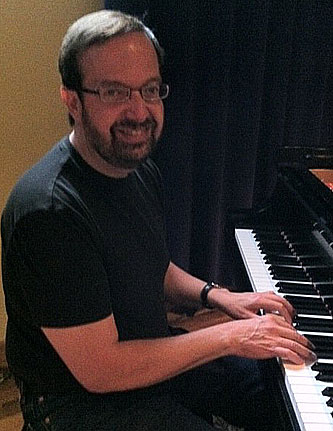 Kevin
Kern: George was arguably the greatest single influence on my
musical development. As both a blind man and a musician, he showed
me that it was possible not just to survive, but to succeed in music
and in life.
Kevin
Kern: George was arguably the greatest single influence on my
musical development. As both a blind man and a musician, he showed
me that it was possible not just to survive, but to succeed in music
and in life.
His greatest direct musical influence was his harmonic language and
his musical colors. George had a gift for making the listener pay
attention by playing with a wide variety of dynamics. I was always
impressed by how softly he could play while still bringing individual
ideas to the forefront of a texture. This, combined with harmonies
that owe a great deal to impressionist composers like Debussy and
Ravel, made his sound unique. These are the elements to which I paid
attention growing up and which I draw upon when composing and playing
my own music today.
mwe3: What about some other musicians and groups had an influence
on your music? Were you influenced mainly by jazz, soundtracks and
classical music, or did rock and pop also have an impact?
Kevin Kern: I began studying classical music and moved to jazz
when George came into my life at around age seven. I found myself
attracted to jazz because I loved creating my own music and jazz was
the best creative vehicle for me at the time. As a legally blind person
who found reading print a struggle, I decided it was best to focus
on music that could be played with just one piano and two hands. Jazz,
with its focus on improvisation and short repeatable forms, became
an ideal medium for me then. While I was exposed to the popular music
of the day growing up, my greatest influences as both a composer and
a player were the greats of the classical and jazz traditions.
Now that modern technology has outfitted computers with speech synthesizers
that can describe every aspect of the computer screen, a whole new
world of creative compositional possibilities are becoming available
to blind composers and musicians like me. I expect that future projects
will take advantage of these new possibilities by including more and
more colors from more and more players over time.
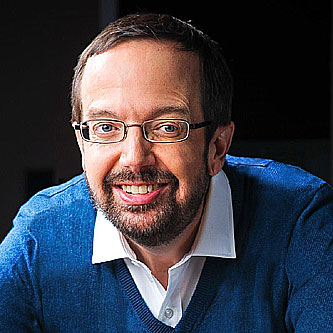 mwe3:
How many albums have you released so far and how do you feel your
music and piano playing has evolved and improved over the years?
mwe3:
How many albums have you released so far and how do you feel your
music and piano playing has evolved and improved over the years?
Kevin Kern: I released eight albums of original material for
Real Music:
In the Enchanted Garden (1996)
Beyond the Sundial (1997)
Summer Daydreams (1998)
In My Life (1999)
Embracing the Wind (2001)
The Winding Path (2003)
Imagination's Light (2005
Endless Blue Sky (2009)
In addition, I released one piano solo album for Real Music called
Enchanted Piano which contains solo versions of some
of my most successful pieces that had previously been released with
orchestration. This came out in 2012.
During my Real Music years, I focused on refining a specific melodic
approach as far as song writing goes. I was always focused on creating
lyrical and memorable melodies that spoke through my piano's musical
voice.
Since leaving Real Music after the release of Enchanted Piano,
I have felt encouraged to draw much more liberally on classical influences
in my choice of melodies, as well as the luscious colors that George's
exquisitely sensitive playing inspired. The results can be heard in
my first independent release, Christmas, (2012,) and a brand
new solo album of original pieces slated for release later this year.
My later albums, particularly these two most recent releases, reflect
an expanding musical color pallet that clearly harkens back to both
George's influence, and that of my primary classical mentor, Mischa
Kottler, with his focus on melody from the perspective of the European
great masters. In fact, my upcoming solo release includes some pieces
where the listener will get a clear sense of my classical roots, and
others where my love of jazz and popular music comes out.
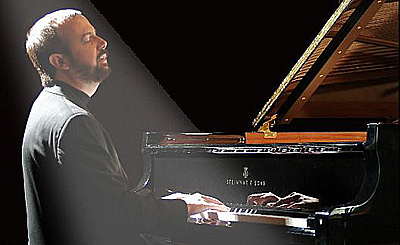 mwe3:
How did working with Real Music inspire your music? How did you become
involved with Real Music and what do you think about their New Age
musical philosophy?
mwe3:
How did working with Real Music inspire your music? How did you become
involved with Real Music and what do you think about their New Age
musical philosophy?
Kevin Kern: I was introduced to Real Music entirely by chance.
(Real Music’s CEO Terence Yallop discovered Kevin playing Christmas
music at a mall during the 1993 Holiday Season.) Prior to meeting
Terence Yallop in 1993, I was completely unaware of the New Age genre.
However, his invitation to record presented a challenge which I found
intriguing at the time. Despite my lack of exposure to this new genre,
it soon became clear that there were elements upon which I could draw
from my own experience that would fit well with Terence’s concept.
The key would be to create melodies that would appeal to this new
audience based on examples of the music he admired. For me, that meant
creating a sound that strongly reminded me of the kinds of themes
that Mozart would write, for example.
But that was only part of the picture. When I went into the studio
to record my first album for Real Music, I had seven songs prepared.
After several conversations with Terence, I decided to draw upon a
freestyle compositional method I hadn’t visited in many years
prior to then. It’s a technique that I’ve come to call,
“sound painting.” Here’s an example of how it worked.
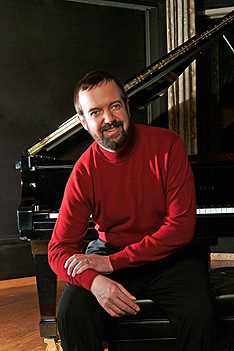 When
I was a boy, my home town team, The Detroit Tigers, won the World
Series in seven epoch games. Now, in those days, the World Series
was only played during the day. That meant that my father had to miss
every game because he was at work. So, when he came home at night,
he would ask me to go to the piano and “play the game.”
I would then go to the piano and set the scene and try to create a
musical picture of some dramatic event from that day’s game.
Both my hands and my vocabulary were small. I was nine years old then.
But the idea quickly took hold and I would use the piano from then
on to describe the world, as I saw it with the limited vision I had,
to family and friends.
When
I was a boy, my home town team, The Detroit Tigers, won the World
Series in seven epoch games. Now, in those days, the World Series
was only played during the day. That meant that my father had to miss
every game because he was at work. So, when he came home at night,
he would ask me to go to the piano and “play the game.”
I would then go to the piano and set the scene and try to create a
musical picture of some dramatic event from that day’s game.
Both my hands and my vocabulary were small. I was nine years old then.
But the idea quickly took hold and I would use the piano from then
on to describe the world, as I saw it with the limited vision I had,
to family and friends.
In the context of these first studio sessions, I told Terence I could
paint a musical picture of anything he could describe. So, he suggested
scenes and I would realize them on the piano. Even though I hadn’t
done this sort of thing in years, it all came flooding back, thanks
to Cookie Morenco’s extraordinary vintage Steinway and its remarkable
soul. All of the piano solo tracks on that first CD were created using
this technique. The combination of composing melodies inspired by
my classical experience, along with reconnecting with this sound painting
method of describing the physical world using the piano, helped bring
forth In the Enchanted Garden.
Throughout my years with Real, I came to appreciate the positive
healing power that my music has had on listeners around the world.
I have been fortunate to make music that has been with my listeners
at the most remarkable times in their lives. Whether it was a bride
walking down the aisle, or a patient undergoing chemo therapy, I have
had the opportunity to touch all kinds of people at some of the most
pivotal points in their lives through my music. It's been a remarkable
experience and I want to express my gratitude to everyone for the
chance to make a difference.
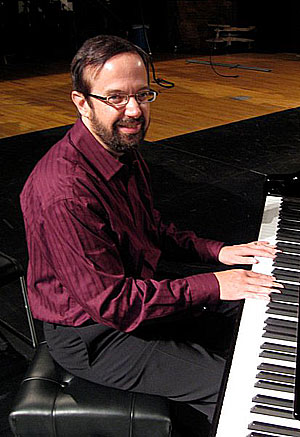 mwe3:
How far back does healing music go? Piano music has always had a calming
effect on people. Is there a period of piano music you like the best
and what about soundtrack music? I hear a lot of that in your music,
even an Ennio Morricone feeling.
mwe3:
How far back does healing music go? Piano music has always had a calming
effect on people. Is there a period of piano music you like the best
and what about soundtrack music? I hear a lot of that in your music,
even an Ennio Morricone feeling.
Kevin Kern: There is no particular style period that I enjoy
over another. I enjoy music from the four major classical style periods,
Baroque, Classical, Romantic and contemporary. I'm also fond of main
stream jazz from pianists like Bill Evans, Herbie Hancock, and others.
You should also add "The Great American Songbook," composers
like Gershwin, Cole Porter, and Irving Berlin. And, before I forget,
let's include my personal favorite, Michel Legrand.
Since you mentioned movie soundtracks, I should mention that, despite
my severely poor vision, I have always wanted to write music for film.
In fact, I have always been drawn to the great movie soundtrack composers,
John Williams, Thomas Newman, Ennio Morricone, and others. It's amazing
how the right score can positively impact a film. Besides, great film
scores are a tremendous resource for learning how to blend instruments
together in new and traditional combinations. I’m always learning
from these modern masters that way.
mwe3: What musicians recording today do you also feel are leading
the way in healing, New Age music and symphonic / orchestra sound
track music?
Kevin Kern: I was always a fan of Secret Garden. Their melodies,
combined with that haunting violin sound, creates something that's
truly one-of-a-kind. I also enjoy the work of a Korean pianist named
Yiruma. I've never met him, but I get the sense we hear the world
very similarly.
mwe3: You just returned from Korea where you did some shows.
What’s been the reaction to your music outside the US, what audiences
do you most like playing to, and in what other countries have you
performed? Is music the best cultural ambassador we have?
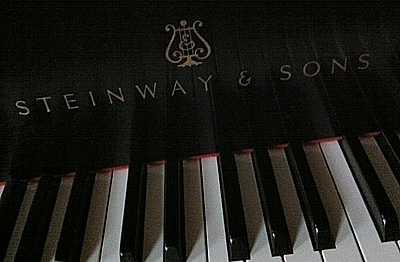 Kevin
Kern: I've had the good fortune to play several tours throughout
Asia over the years. I've been to Korea, Taiwan and Singapore several
times. I've also played in Japan and China. Asian audiences seem to
have a remarkable affinity for my music. It's been used in a variety
of contexts from TV and film to commercials and other applications.
So, my songs are part of the fabric of life in these countries. The
whole experience has been very gratifying.
Kevin
Kern: I've had the good fortune to play several tours throughout
Asia over the years. I've been to Korea, Taiwan and Singapore several
times. I've also played in Japan and China. Asian audiences seem to
have a remarkable affinity for my music. It's been used in a variety
of contexts from TV and film to commercials and other applications.
So, my songs are part of the fabric of life in these countries. The
whole experience has been very gratifying.
I wouldn't characterize one country's audience as being more fun to
play for than another. Everywhere I go, I have been welcomed with
open arms by supportive fans who have made me feel at home, wherever
home happens to be. Not only that, the Steinways I've played on tour
have been absolutely breathtaking. For someone like me who derives
a large portion of his creative energy from a special relationship
with the piano itself, the chance to play on some of the finest instruments
can really make a world of difference.
mwe3: Can you tell us what pianos you feature on your current
recordings and what pianos you like playing most in a live setting?
How has your choice of pianos changed over the years and for instance,
how many different pianos are you using on the Always Near
compilation? Steinway has always been the number one piano right?
Have you been to the Steinway Building showroom on 57th Street in
Manhattan?
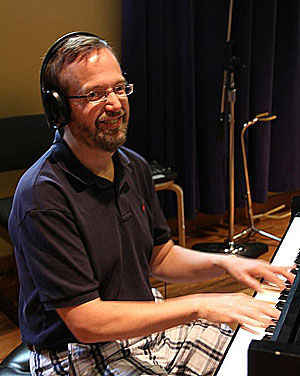 Kevin
Kern: Most of the music on Always Near was recorded
on Steinway pianos. With the exception of three album projects in
the middle of my Real Music career, Summer Daydreams,
In My Life, and Embracing the Wind, everything
I've done has been recorded on Steinways. That's something I don't
ever plan to change. I became a Steinway Artist in 2005 precisely
because, after recording three CDs on a Yamaha, I realized that there
was a certain essential character unique to the Steinway piano that
brought out something essential from the inner core of my musical
being. This was both as a composer and a pianist. Steinways inspire
something in my compositional self that no other instrument can deliver.
That was true when I recorded my very first CD on a vintage Steinway
B from 1885, and was indelibly reinforced when I played a stunning
Steinway D for The Winding Path in 2003.
Kevin
Kern: Most of the music on Always Near was recorded
on Steinway pianos. With the exception of three album projects in
the middle of my Real Music career, Summer Daydreams,
In My Life, and Embracing the Wind, everything
I've done has been recorded on Steinways. That's something I don't
ever plan to change. I became a Steinway Artist in 2005 precisely
because, after recording three CDs on a Yamaha, I realized that there
was a certain essential character unique to the Steinway piano that
brought out something essential from the inner core of my musical
being. This was both as a composer and a pianist. Steinways inspire
something in my compositional self that no other instrument can deliver.
That was true when I recorded my very first CD on a vintage Steinway
B from 1885, and was indelibly reinforced when I played a stunning
Steinway D for The Winding Path in 2003.
You asked if I have ever visited Steinway Hall in New York. As it
happens I've visited both Steinway Hall in Manhattan and the factory
in Astoria. I was given a private tour of the factory by Jenn Gordon,
head of the Concert and Artist Division of Steinway. I left with a
new appreciation of the years of tradition and extraordinary craftsmanship
that go into those one-of-a-kind instruments. At the end of the tour,
I had a chance to sit and play a selection of brand new instruments.
No matter how many years you've played, there's no way to get over
that "kid in a candy store” feeling in a situation like
that.
mwe3: Who else is or has been involved in the production of
your albums as far as sound engineering, piano techs or co-producers?
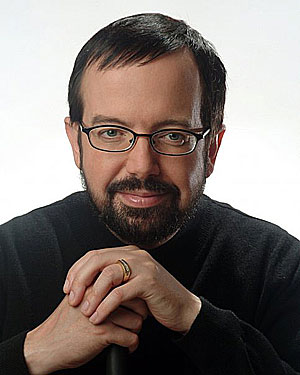 Kevin
Kern: I have always been my own producer. My early albums were
engineered by Cookie Marenco at her studio, OTR, in Belmont California.
She was the one with the 1885 Steinway B. That instrument had a soul.
Kevin
Kern: I have always been my own producer. My early albums were
engineered by Cookie Marenco at her studio, OTR, in Belmont California.
She was the one with the 1885 Steinway B. That instrument had a soul.
My next five CDs were done at Fantasy Studios in Berkley, California.
The engineer was a remarkable guy named Ron Davis. Ron and I really
connected on those projects. He had a gift for making everyone feel
at ease so that we could all do our best. Fantasy is a massive complex
that occupied an entire city block. It had four studios. At any one
time someone like Santana might be in one of the other studios. We'd
rent the place out for a week and it would feel like a resort vacation.
There was a spacious living room and a small kitchen behind the control
room of the studio we preferred. While Ron and I were working on music,
my wife Pam would cook us amazing meals or snacks which would invariably
attract players from the other studios in the building. Needless to
say, we had a blast in those days.
In 2007, Pam and I moved to the Twin Cities and I began working with
Matthew Zimmerman at Wild Sound Studios. Wild Sound has a remarkable
Steinway B in house and the combination of that piano and Matthew's
special sensibilities has combined to bring out something special
in the projects I've done there. Not only that, the Twin Cities has
a remarkable pool of talented musicians who can meet one's every need.
Beginning with Endless Blue Sky, I've taken advantage
of the many musical possibilities this remarkable environment has
provided. I'm very happy with the situation I have there now.
mwe3: What other musicians have you played with over the years
and if you could work with some other musicians who would you choose?
Kevin Kern: In the past, I've worked with a variety of players.
The most exciting experience I had was playing with the extraordinary
Paul McCandless, of the group, Oregon. McCandless is without question
the greatest living improviser on the oboe. I wrote pieces on Beyond
the Sundial expressly for him so I could take advantage of
his singular gifts.
 While
on tour in Asia, I've also met some phenomenal players, such as the
time that the concert master of the Taipei Symphony, Roger Chih-i
Chiang, joined me for concerts in Taiwan. He memorized one of my songs
and played it from memory as an unplanned solo after rehearsing it
once just hours before. You have to love that.
While
on tour in Asia, I've also met some phenomenal players, such as the
time that the concert master of the Taipei Symphony, Roger Chih-i
Chiang, joined me for concerts in Taiwan. He memorized one of my songs
and played it from memory as an unplanned solo after rehearsing it
once just hours before. You have to love that.
At the moment, there's no one player or instrument for which I would
like to write more than another. I seem to be drawn to a chamber music
sound that might lend itself to a string quartet. But I think I'll
just let the music unfold and see what instruments and players suggest
themselves.
mwe3: What plans do you have for your next music in 2014 into
2015 and are you planning any upcoming concerts in the future?
Kevin Kern: Well, the most important thing is the new solo
CD I just completed which will be coming out shortly. I plan to follow
that up in 2015 with a project where I return to an ensemble conception
with strings and possibly guitar.
As far as concerts go, I'm scheduled to return to Taiwan for two shows
in November. I'll also be doing some dates in Southern California
in January of 2015 with more dates in the works as the ensemble CD
takes shape.
For updates, please visit www.realmusic.com
or www.kevinkern.com



